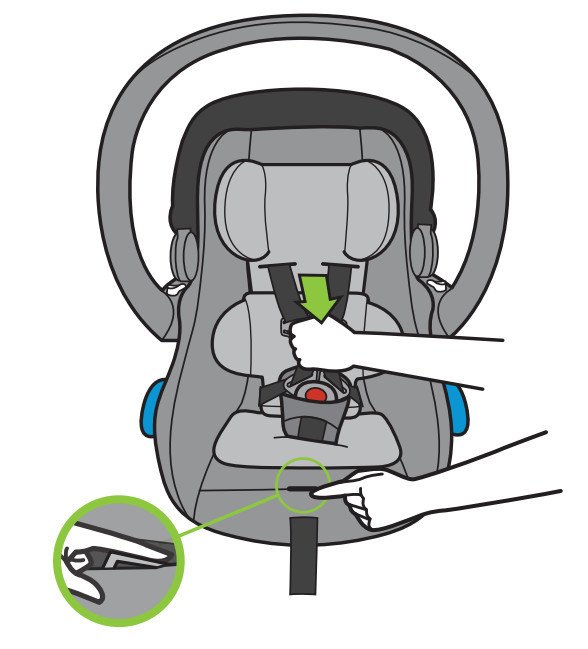To loosen baby car seat straps, press the harness release button and pull the straps out. Ensure your movements are gentle to avoid twisting.
Ensuring the safety and comfort of your little one during car rides is paramount for every parent. Adjusting the car seat straps correctly plays a crucial role in this. Over time, straps can tighten or become too snug, especially as your baby grows or wears thicker clothing.
Knowing how to adjust these straps properly not only guarantees a secure fit but also ensures your child remains comfortable throughout the journey. Mastering this simple yet vital skill will make car rides smoother and stress-free for both you and your baby. Remember, a well-adjusted car seat is key to your baby’s safety on the road.

Credit: www.youtube.com
The Importance Of Proper Car Seat Strap Adjustment
Securing your child safely in a car seat is crucial. Proper strap adjustment is a key aspect of car seat safety. It ensures your baby remains safe and comfortable during car rides. Straps that are too tight or too loose can lead to serious risks.
Safety Concerns With Tight Straps
Tight straps can cause harm. They may restrict your baby’s breathing and movement. In a collision, improper strap tension can increase injury risk. It’s vital to ensure straps are snug yet not too constrictive.
Comfort And Security Balance
Straps should hold your child securely. They must also allow for comfort. A balance between security and comfort is key. It prevents distress and potential harm during journeys.
- Check the car seat manual for strap adjustment guidelines
- Perform the pinch test to ensure straps are snug
- Recheck strap tension regularly as your child grows

Credit: m.youtube.com
Identifying When Straps Need Adjustment
Securing your little one in a car seat is crucial. But kids grow fast. Straps often need adjustments. It’s important to know when to loosen them. This ensures comfort and safety.
Growth And Development Indicators
Babies grow quickly. They may seem snug overnight. Check the car seat straps often. Look for these signs:
- Shoulder straps should be at or just above shoulders.
- Straps pressing into your child’s shoulders mean they’re too tight.
- Difficulty buckling the harness is a clear sign.
Adjust the straps if you notice any of these issues. Your baby’s comfort and safety are key.
Seasonal Clothing Changes
Weather changes mean different clothes. Thick winter coats require looser straps. Light summer clothing means tightening them again. Follow these steps:
- Remove bulky clothing before strapping your child in.
- Adjust the straps to fit snugly over their outfit.
- Do the “pinch test”. If you can pinch the strap fabric at the shoulder, it’s too loose.
Keep these tips in mind every season. Your child’s safety is worth it.
Types Of Car Seat Straps And Buckles
Securing your child safely in a car seat involves understanding the types of car seat straps and buckles. These components are crucial for protection and comfort. Let’s explore the diverse mechanisms and manufacturer-specific variations.
Understanding Different Mechanisms
Car seat straps and buckles come in various designs. Each serves to secure your child safely. Here are common types:
- 5-point harness: This includes two shoulder straps, two waist straps, and one strap between the legs.
- 3-point harness: It has two shoulder straps coming together in a buckle at the leg.
- T-shield: A padded T-shaped shield attaches to shoulder straps.
- Overhead shield: A padded tray swings down around the child.
Each design ensures safety and comfort. Your choice depends on your child’s age, weight, and height.
Manufacturer-specific Variations
Different car seat brands may have unique features for their straps and buckles. It’s important to know these variations.
| Brand | Type of Strap/Buckle | Key Feature |
|---|---|---|
| Brand A | 5-point harness | Easy-adjust straps |
| Brand B | 3-point harness | One-click buckle |
| Brand C | T-shield | Comfort padding |
This table highlights the unique aspects of different brands. Knowing these helps you choose the right car seat.
Preparation Steps Before Loosening Straps
Before you start loosening your baby’s car seat straps, you need to prepare. These steps make the process easier and safer. Let’s go through them together.
Reading The Car Seat Manual
Always start by reading the manual. Each car seat is different. The manual has specific instructions for your model. It tells you how to adjust the straps correctly. This step is crucial for your baby’s safety.
Ensuring Car Seat Is Unoccupied
Make sure the car seat is empty. Never adjust straps with your baby in the seat. It could be unsafe. Removing your child also gives you better access to the straps. This makes the adjustment process smoother.
- Check the car seat manual for specific instructions.
- Ensure the car seat is not in use.
- Adjust the straps according to the manual.
Loosening Straps: Step-by-step Guide
Straps too tight on your baby’s car seat? Follow this easy guide to loosen them. Parents need to adjust straps often for their child’s comfort and safety. Our step-by-step guide makes it simple.
Locating The Adjustment Features
First, identify where the strap adjustments are. Most car seats have a button or lever. This is usually at the seat’s front or back. Look for a label or sign that indicates the adjuster’s location.
- Check the manual: It has diagrams for your specific seat.
- Search at the seat base: Adjustment features are often here.
- Inspect the back: Sometimes, features are hidden behind the seat.
Releasing The Tension
With the adjuster located, it’s time to loosen the straps. This step ensures your baby sits comfortably and safely.
- Press or lift the adjuster: This will unlock the strap.
- Pull the straps: Gently tug them to the desired length.
- Test the fit: Straps should be snug but not too tight.
Always double-check the slack. You should fit no more than two fingers between the strap and your baby.
Checking The Fit: Ensuring Safety Post-adjustment
Checking the Fit: Ensuring Safety Post-Adjustment is crucial after loosening baby car seat straps. Proper fit ensures maximum safety for your child during travel. Post-adjustment checks are essential for peace of mind.
The Pinch Test For Correct Fit
Perform the Pinch Test to verify strap snugness.
- Place thumb and forefinger on the strap at your child’s shoulder level.
- Pinch the strap with a gentle tug.
- If you can’t pinch excess webbing, the fit is right.
Straps should lie flat without twists. They should not leave marks on your child’s skin.
Double-checking For Evenness
Straps must be even on both sides. Uneven straps can compromise safety.
- Check the harness slots. They should match on both sides.
- Ensure the chest clip is at armpit level.
- Adjust if one side seems tighter than the other.
Your child’s comfort and safety are paramount. Always take time for these checks.
Common Mistakes To Avoid
Securing your baby in a car seat is crucial. Yet, some mistakes can compromise safety. Let’s explore common errors and ensure maximum protection for your little one.
Over-loosening The Straps
Right tension in car seat straps is key. Some parents loosen straps too much. A snug fit is essential. Straps should allow one finger to slip underneath. More than that increases risk during sudden stops.
Neglecting Regular Checks
Straps may stretch or shift. It’s vital to check them before each trip. Look for twists or tangles. Ensure the chest clip is at armpit level. Make adjustments as needed for a secure fit.
- Examine straps often for wear and tear.
- Re-adjust after every growth spurt.
- Read the manual for correct use.
| Check Point | Action Required |
|---|---|
| Strap Position | Ensure chest clip at armpit level |
| Tension | Allow only one finger space |
| Twists | Remove any twists or tangles |

Credit: parenting.stackexchange.com
Additional Tips For Car Seat Strap Maintenance
Maintaining car seat straps is key for your baby’s safety. Regular care ensures straps work well and last longer. Here are some easy tips.
Cleaning And Care For Straps
Keep straps clean for smooth adjustments. Dirt and spills can cause sticking. Here’s a simple guide:
- Remove straps according to the manual.
- Use mild soap and water for cleaning.
- Avoid harsh chemicals that can weaken straps.
- Air dry completely before re-attaching.
When To Consider Professional Help
Sometimes, DIY won’t fix strap issues. Know when to seek help:
| Sign | Action |
|---|---|
| Frayed Straps | Get them replaced. |
| Stuck Adjuster | Consult a technician. |
| Strange Noises | Have it checked out. |
Remember, safety comes first. A professional can ensure everything is secure.
Frequently Asked Questions
Why Should Car Seat Straps Be Loosened?
Car seat straps may need loosening for a comfortable and secure fit as the baby grows or when adjusting for thicker clothing.
What’s The Correct Way To Adjust Car Seat Straps?
To adjust car seat straps, consult the manual, press the harness adjustment button, and pull or release the straps to the desired snugness.
Can All Baby Car Seats Be Adjusted?
Most baby car seats come with adjustable straps to accommodate a growing child, but always refer to the product’s manual for specific instructions.
How Do I Know If The Car Seat Straps Are Too Tight?
Straps are too tight if you cannot pinch any excess webbing between your fingers at the child’s shoulder after buckling in.
Where Is The Adjustment Button On Baby Car Seats?
Typically, the adjustment button is located at the front base of the car seat, but consult your model’s manual for the exact position.
Conclusion
Ensuring your baby’s comfort and safety in the car is paramount. Mastering the adjustment of car seat straps can be simple and stress-free. Remember, regular checks and tweaks are key to a secure and snug fit. Drive with peace of mind, knowing your little one is safe and content.
Safe travels!





